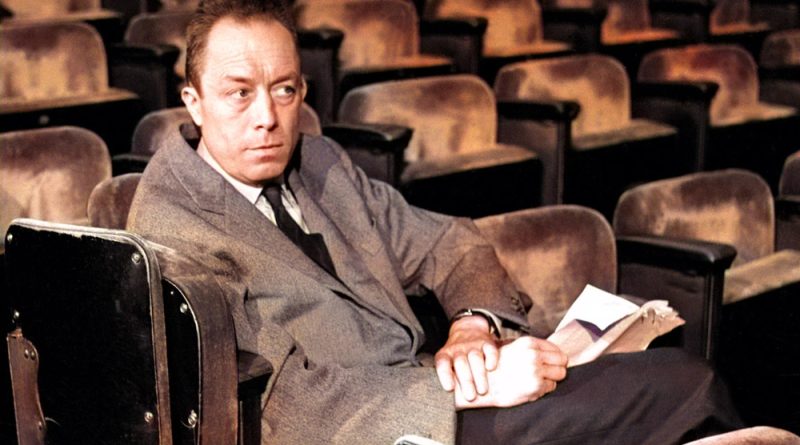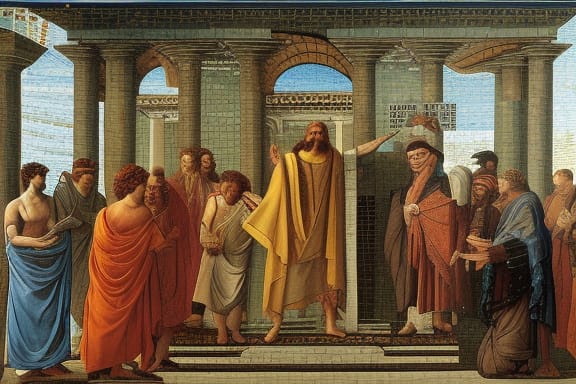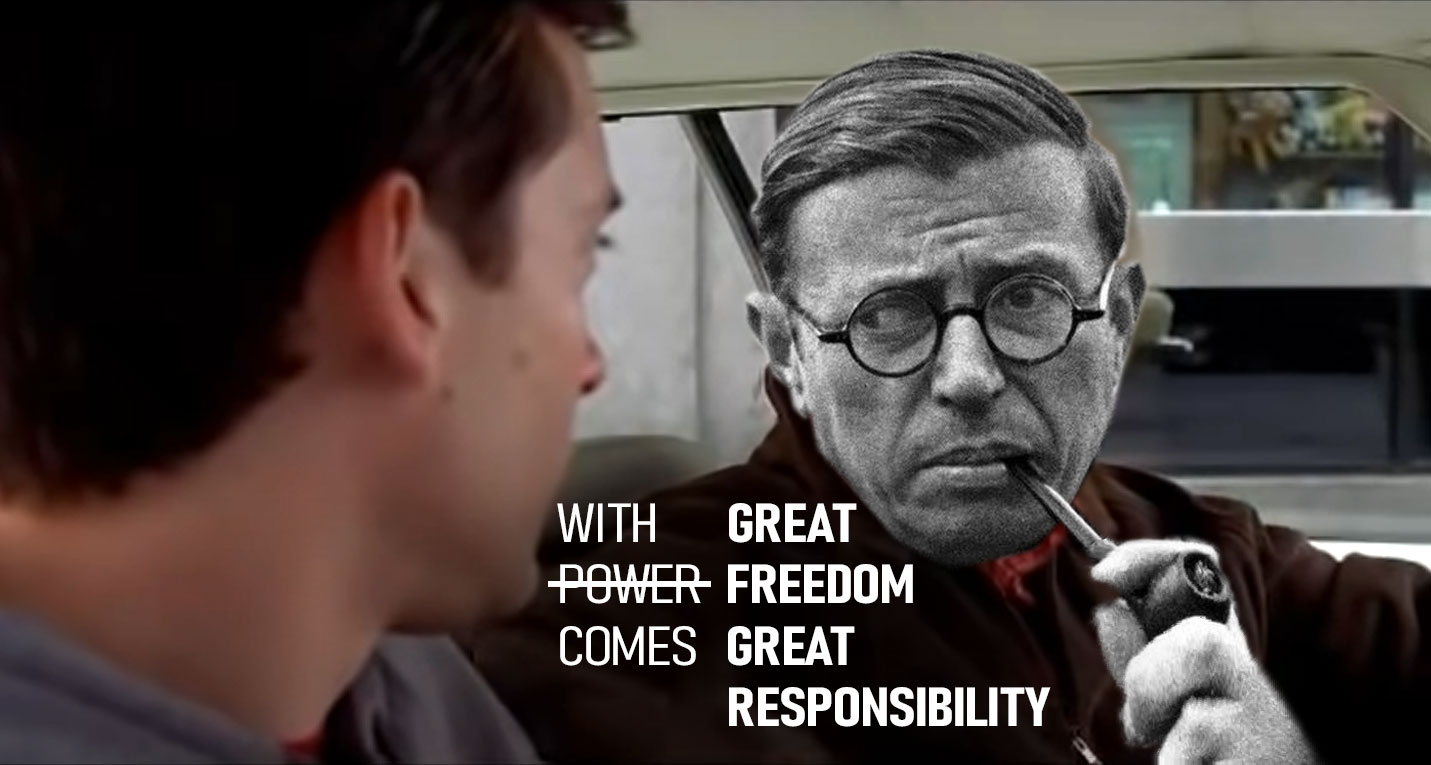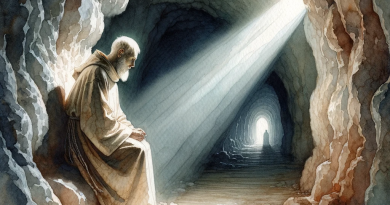Albert Camus: Is human existence meaningful?
A thinker rooted in the turbulent 20th century, Albert Camus offered provocative insights that challenge our perceptions of life and its inherent meaning, or lack thereof. At the heart of this discussion stands the “Myth of Sisyphus”, a narrative deeply interwoven with concepts that dare to question the very foundations of human existence.
Camus’s thoughts were conceived in the crucible of a world recovering from the ravages of World War II, a time when existentialism, spearheaded by philosophers like Jean-Paul Sartre, was gaining prominence. While Sartre focused on individual responsibility and freedom, Camus shifted his focus to the conflict between our desire for reason and the apparent meaningless universe.
Albert Camus himself, a Nobel laureate, was not just a philosopher but also a journalist and a playwright. The events and experiences of his life in Algeria and then France coloured his perceptions and reflections on human existence. His profound ideas sprouted from real situations, lending them a gritty authenticity that resonates deeply with a diverse audience.
As we venture further, we will scrutinise the fundamental concept that Camus introduces – the absurd, alongside the evocative narrative of Sisyphus, a character drawn from Greek mythology. This character serves as a symbolic representation of the ‘absurd hero,’ a persona who embodies resilience and defiance in the face of a seemingly futile existence. To dissect the intricacies of this narrative and its wider implications, we will draw comparisons with other literary figures who embody similar traits, offering a richer and more nuanced understanding of this philosophical stance.
The goal here is not just to analyse but to foster a deeper connection with the philosophical insights that Camus offers, illuminating the richness and depth of his perspective on the human condition.
Part 1: Setting the Stage – Historical and Biographical Context
The 20th century, particularly the years following World War II, witnessed a significant shift in philosophical thought, with existentialism burgeoning as a prominent philosophical movement. Here, we see Camus, whose contemplations prominently veered away from traditional philosophical narratives, offering a fresh perspective on the intrinsic absurdity of life.
During this period, we find the rise of thinkers such as Sartre and Simone de Beauvoir, who were busy championing the concepts of freedom, individuality, and personal responsibility. These ideas were somewhat divergent from Camus’s perspective. Sartre’s existentialism, for instance, embraced the void and proposed that individuals are condemned to be free, thereby burdening them with the responsibility of carving out their essence through actions and choices.
Camus, on the other hand, focused on the absurdity that arises from the clash between human desires for order and the chaotic, indifferent universe that surrounds them. This point of contention was significant. It spotlighted the futile human struggle to find meaning in a world that resists such narratives, a notion vividly personified through the Greek mythological figure of Sisyphus.
Diving into the details of Camus’s life offers a rich backdrop to understand the germination of these ideas. Born in 1913 in Algeria, a French colony at the time, Camus experienced the complexities of colonialism first-hand. His upbringing in a poverty-stricken household and early experiences in the tumultuous political environment of his homeland arguably instilled in him a keen sense of the disparities and absurdities of life.
His education played a pivotal role too. He studied philosophy at the University of Algiers, which facilitated his entry into the intellectual circles that were fervently discussing the pressing issues of their time. Simultaneously, his involvement in theatre and journalism allowed him to experiment with different mediums to articulate his philosophical thoughts.
It is essential to mention his connection with the French Resistance during the Second World War, a period that undoubtedly deepened his understanding of human suffering and resilience. This real-life exposure to the atrocities of war and the resistance against oppressive forces finely integrated into his literary and philosophical works, offering a grounded perspective on the struggle for meaning and justice.
As a writer, he often used his narratives to pose serious questions about the human condition, painting characters that mirrored his philosophical musings. He introduced us to individuals grappling with the absurdities of existence, often personifying the relentless pursuit of meaning in a seemingly indifferent universe.
As we shift our focus towards a more detailed analysis of the absurd and its representations in Camus’s works, it becomes evident that his historical backdrop and personal experiences were not just incidental. These aspects intricately intertwined with his philosophical narratives, providing a robust foundation for the insights and counterarguments that we shall now explore. This analysis will further encompass a comparison with other literary figures who embarked on similar quests, fostering a richer understanding of Camus’s position in the philosophical landscape.
Part 2: Into the Absurd – Unpacking the Concept
The “absurd”, a core element of Camus’ philosophical thought, highlights the confrontation between humans, beings who incessantly seek meaning, and a universe that resolutely remains indifferent to such quests. Imagine tirelessly seeking an answer in a vast, silent cosmos, a scenario wherein the dialogue seems forever one-sided. This represents the essence of absurdity as depicted by Camus, a situation where individuals ardently attempt to find purpose in a seemingly purposeless world.
To truly grasp this notion, let’s turn our attention to Camus’s analogy of Sisyphus, a character borrowed from Greek mythology. As legend has it, Sisyphus was condemned by the gods to push a boulder up a hill, only to watch it roll back down, in a ceaseless cycle for all eternity. It’s here that Sisyphus emerges as the quintessential absurd hero, embodying an existence marked by futility but also defiance and resilience.
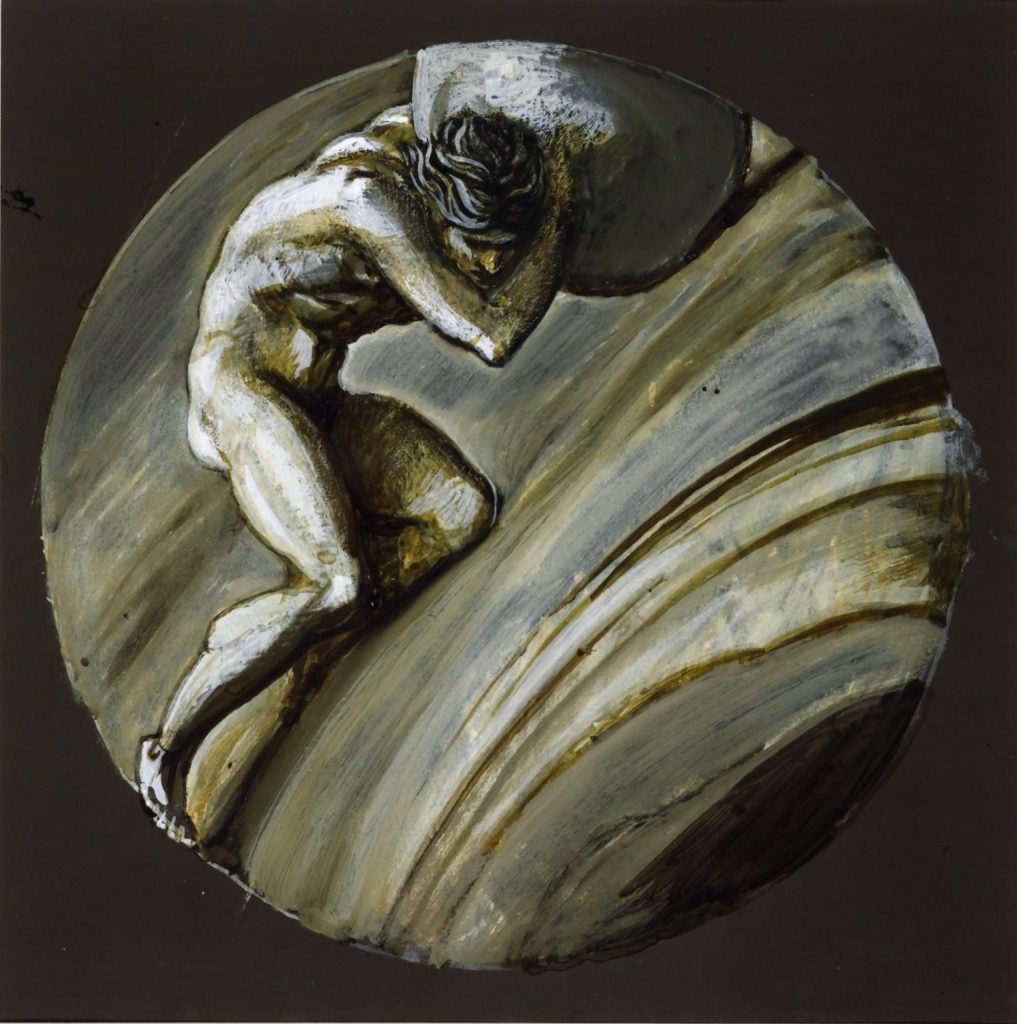
In drawing parallels between the myth of Sisyphus and the modern individual, Camus seems to be illustrating a metaphor for human existence. This isn’t merely a depiction of despair, but also a narrative of resistance. Sisyphus, despite his awareness of the futile endeavour, continues his toil relentlessly. This perspective proposes a bold refusal to succumb to the nihilism that a purposeless universe might suggest, promoting instead a form of rebellion, a stubborn persistence to keep striving even when faced with the stark indifference of the universe.
This point is crucial in differentiating Camus from other philosophers of his time. For instance, while existentialists like Sartre spoke of creating one’s own essence in a universe devoid of predetermined paths, Camus leaned more towards acknowledging the futile nature of such endeavours. But even in acknowledging the absurdity, he does not advocate for surrender; rather, he encourages a fierce battle against the apparent meaninglessness, a theme recurrent in his other works, including novels like “The Stranger”.
Here, it might be illuminating to draw a contrast with another literary figure that embodies existential traits – Dostoevsky’s Raskolnikov from “Crime and Punishment”. Raskolnikov, in his nihilistic philosophies, represents a figure grappling with existential angst, showcasing the tumultuous journey of a man in search of meaning and justification for his actions. The contrasting approaches of these two characters to the predicaments of life present a fascinating insight into the diverse manifestations of existential thought in literature.
As we proceed, we shall focus on drawing deeper insights from Camus’s works, with an emphasis on understanding the nuances that shape the absurd hero.
Part 3: Philosophical Meanderings – Wider Philosophical Context
The absurdism that Camus propounded, while unique in its stance, shares many converging points with existentialism. The latter’s focus on individual freedom, choice, and responsibility, contrasts with Camus’ portrayal of a seemingly indifferent universe, where efforts for genuine personal meaning often hit a brick wall.
However, one might argue that this divergence is what places Camus in a league of his own. His focus on the human spirit’s unyielding defiance in the face of the absurd establishes a striking balance between despair and hope, a nuance that perhaps goes beyond the purview of traditional existentialist thought. Through this lens, life is not just a series of choices but an ongoing rebellion against the meaninglessness that seeks to engulf the human experience.
Shifting gears, we find ourselves confronted with another thought-provoking aspect of Camus’s philosophy: the suicide dilemma.
“There is but one truly serious philosophical problem,” Camus starts off, “and that is suicide. Judging whether life is or is not worth living amounts to answering the fundamental question of philosophy. All the rest— whether or not the world has three dimensions, whether the mind has nine or twelve categories—comes afterwards.”
Camus introduces suicide as a legitimate response to the absurd, a solution that one might consider when faced with a life that appears devoid of purpose and meaning. But Camus advocates for a rejection of this escape route, urging instead a robust engagement with life, a decision to seek meaning despite apparent futility. This stance positions suicide not as a personal choice but as an intellectual problem, a subject of philosophical scrutiny.
It is intriguing to compare this perspective with the thoughts expressed by other philosophers such as Friedrich Nietzsche, who asserted the necessity of affirming life, embracing even its harshest realities without recourse to illusions or false comforts. Moreover, this discourse evokes memories of various literary works, where characters are often faced with this grim dilemma.
One may consider Leo Tolstoy’s Ivan Ilyich, who, in grappling with his mortality, engages in a profound reflection of his life’s worth, a poignant representation of the human condition’s depth and complexity. In The Death of Ivan Ilyich, the protagonist grapples with the absurdity of life, akin to Camus’ philosophy. Ilyich, nearing death, realises that his pursuit of societal norms eclipsed personal fulfilment. His ultimate acceptance of life’s futility mirrors the surrender of Camus’ absurd hero, illustrating the harrowing yet liberating transition from ignorance to awareness. This narrative, both a caution and a beacon, urges the acknowledgement of life’s inherent absurdity and the pursuit of authenticity over conformity, enriching our understanding of existential philosophies as we venture further into this discussion.
Part 4: Society and Text – Social Context and Intertextuality
As we proceed, we find ourselves facing the task of deciphering the intricate connection between Camus’ philosophy and the modern world. Is the absurd hero relevant in today’s society.
It isn’t a stretch to claim that the modern age, with its frenzied pace and its oftentimes conflicting narratives, mirrors a sort of absurdist stage where individuals continually strive to carve out a niche of meaning. Camus’ absurd hero can be seen in the relentless activist fighting for justice in an unequal world, or perhaps in the solitary artist seeking beauty in a chaotic environment. These figures, akin to Sisyphus, face an uphill task, continually pushing their ‘boulder’ with a resilience that defies the surrounding absurdity.
In literature we find a rich field of narratives and characters, echoing the theme of the absurd hero across varied contexts. We find a curious resonance of Camus’ philosophy in Samuel Beckett’s “Waiting for Godot,” where the central characters engage in an eternal wait for a character that never quite turns up, a testament to human resilience in the face of a seemingly indifferent universe. Similarly, the protagonist in Franz Kafka’s “The Trial” navigates a bizarre and illogical bureaucracy, showcasing the struggle and the perseverance that are characteristic of the absurd hero.
Furthermore, connections can be drawn to philosophies that echo a similar sentiment. For instance, Nietzsche’s concept of “Eternal Recurrence”, a sort of infinite loop, is a thought experiment that asks us to live as though we would repeat our lives infinitely. Published almost 60 years before The Myth of Sisyphus, Nietzsche’s Thus Spoke Zarathustra speaks to a kind of radical acceptance of life, similar to that espoused by Camus.
Conclusion: Camus’ Legacy
Camus met his untimely end in a car accident on the 4th of January, 1960, an event starkly contrasting the deliberate and contemplative nature of his philosophical investigations. His demise, abrupt and unexpected at the age of 46, somewhat mirrors the philosophy he propagated – a testimony to life’s unpredictability and inherent absurdity. It perhaps serves as a poignant reminder that the pursuit of understanding and grappling with life’s complex questions is an endeavour both ceaseless and infinitely valuable.
While drawing parallels with literary maestros like Leo Tolstoy, we ventured into existential philosophy, dissecting characters who mirror Camus’ absurd hero, reflecting societal narratives that resonate profoundly with contemporary times. These narratives, rich with allegories and nuances, serve as guides in our quest to understand the multilayered aspects of human existence, echoing through different eras and literary landscapes.
And here, as we find ourselves at the crossroads of reflection and anticipation, we witness the amalgamation of philosophy and literature forging a rich narrative, offering insights and inviting questions that resonate deeply with our inherent quest for meaning. We observe how Camus’ philosophy intertwines with societal narratives and literary explorations, fostering a rich and engaging discussion that encourages us to contemplate deeper.
In embracing the absurd, Camus encourages us to live authentically, shedding the pretences that often bind us to societal expectations. It is through this lens that we may find solace in the absurdity, fostering a resilience that enables us to navigate the complexities of the human condition with grace and poise.
The essence of Camus’ philosophy, with its intricate interplay of absurdity and rebellion, continues to urge us to forge ahead with resilience and acceptance, nurturing a spirit of defiance against the face of absurdity, in a relentless pursuit of authenticity and personal fulfilment.
